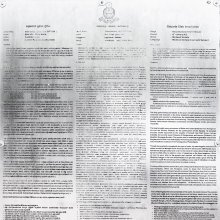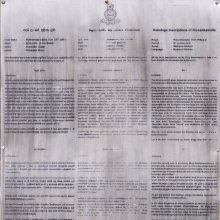Virabahu, Vīrabāhu, Vira-bahu: 11 definitions
Introduction:
Virabahu means something in Buddhism, Pali, Hinduism, Sanskrit. If you want to know the exact meaning, history, etymology or English translation of this term then check out the descriptions on this page. Add your comment or reference to a book if you want to contribute to this summary article.
Images (photo gallery)
In Hinduism
Purana and Itihasa (epic history)
Source: archive.org: Puranic Encyclopedia1) Vīrabāhu (वीरबाहु).—A brother of Subrahmaṇya. It is stated in Skanda Purāṇa, that this Vīrabāhu stood with Subrahmaṇya and fought bravely.
2) Vīrabāhu (वीरबाहु).—One of the hundred sons of Dhṛtarāṣṭra. In the battle of Bhārata he fought with Uttara and Bhīmasena. Bhīmasena killed him with his club. (Mahābhārata, Bhīṣma Parva, Chapter 64, Stanza 35).
3) Vīrabāhu (वीरबाहु).—A king of the country of Cedi. The daughter of Sudāmā the king of Daśārṇa was his wife. It was this king of Cedi who gave protection to Damayantī when she was forsaken by her husband Nala. (Mahābhārata Vana Parva, Chapter 69, Stanza 13).
Source: archive.org: Shiva Purana - English TranslationVirabāhu (विरबाहु) is the name of an attendant (Gaṇa) of Kārttikeya (i.e., Śiva’s son), according to the Śivapurāṇa 2.4.6 (“The miraculous feat of Kārttikeya”).—Accordingly, after the Brahmin named Nārada spoke to Kumāra (Kārttikeya): “On hearing his words, Śiva’s son, the emperor of the gods, sent his attendant Vīrabāhu on that mission. At his bidding, the great hero Vīrabāhu who bowed to his master with devotion started in search of it. He searched throughout the universe but nowhere did he find the goat (although) he heard about the havoc done by it. [...]”.
Source: Cologne Digital Sanskrit Dictionaries: The Purana IndexVīrabāhu (वीरबाहु).—A Vānara chief.*
- * Brahmāṇḍa-purāṇa III. 7. 241.
Vīrabāhu (वीरबाहु) is a name mentioned in the Mahābhārata (cf. I.108.12) and represents one of the many proper names used for people and places. Note: The Mahābhārata (mentioning Vīrabāhu) is a Sanskrit epic poem consisting of 100,000 ślokas (metrical verses) and is over 2000 years old.

The Purana (पुराण, purāṇas) refers to Sanskrit literature preserving ancient India’s vast cultural history, including historical legends, religious ceremonies, various arts and sciences. The eighteen mahapuranas total over 400,000 shlokas (metrical couplets) and date to at least several centuries BCE.
Kavya (poetry)
Source: Wisdom Library: Kathāsaritsāgara1) Vīrabāhu (वीरबाहु) is the name of a warrior slain by Udayana (king of Vatsa), according to the Kathāsaritsāgara, chapter 13.Udayana crossed paths with Vīrabāhu and Tālabhaṭa when he escaped from the clutches of king Caṇḍamahāsena, together with Vasantaka, Yaugandharāyaṇa, Vāsavadattā and Kāñcanamālā.
2) Vīrabāhu (वीरबाहु) is the name of an ancient king, as mentioned in the Kathāsaritsāgara, chapter 52. Accordingly, “... but the King Vīrabāhu, though he heard of the matchless beauty residing there, did not carry her off, but remained strictly within the limits of virtue”.
3) Vīrabāhu (वीरबाहु) is one of the five kings that conspired against king Vikramasiṃha from Pratiṣṭhāna, according to the Kathāsaritsāgara, chapter 58. Accordingly, “... once on a time, when he was in his city [Pratiṣṭhāna], five or six of his [Vikramasiṃha’s] relations combined together, and going to his palace, surrounded him. Their names were Mahābhaṭa, Virabāhu, Subāhu, Subhaṭa and Pratāpāditya, all powerful kings. The king’s minister was proceeding to try the effect of conciliation on them, but the king set him aside, and went out to fight with them”.
4) Vīrabāhu (वीरबाहु) is one of the friends of Dhavalamukha, the servant of king Candrāpīḍa from Kanyākubja, according to the Kathāsaritsāgara, chapter 61. Accordingly, as Dhavalamukha said to his wife: “... I always eat and drink with my friends before I come home, for I have two friends in the world. The one is called Kalyāṇavarman, who obliges me with food and other gifts, and the other is Vīrabāhu, who would oblige me with the gift of his life”.
5) Vīrabāhu (वीरबाहु) is the name of an ancient king from Anaṅgapura, as mentioned in the tenth story of the Vetālapañcaviṃśati in the Kathāsaritsāgara, chapter 84. Accordingly, “... there was an excellent king of the name of Vīrabāhu, who imposed his orders on the heads of all kings. He had a splendid city named Anaṅgapura, and in it there lived a rich merchant named Arthadatta”.
6) Vīrabāhu (वीरबाहु) is the name of an ancient king from Ayodhyā, according to the Kathāsaritsāgara, chapter 112. Accordingly, “... in Ayodhyā there lived of old time a king named Vīrabāhu, who always protected his subjects as if they were his own children. And one day the citizens of his capital came to him and said: ‘King, some thieves plunder this city every night, and, though we keep awake for the purpose, we cannot detect them!’”.
The Kathāsaritsāgara (‘ocean of streams of story’), mentioning Vīrabāhu, is a famous Sanskrit epic story revolving around prince Naravāhanadatta and his quest to become the emperor of the vidyādharas (celestial beings). The work is said to have been an adaptation of Guṇāḍhya’s Bṛhatkathā consisting of 100,000 verses, which in turn is part of a larger work containing 700,000 verses.

Kavya (काव्य, kavya) refers to Sanskrit poetry, a popular ancient Indian tradition of literature. There have been many Sanskrit poets over the ages, hailing from ancient India and beyond. This topic includes mahakavya, or ‘epic poetry’ and natya, or ‘dramatic poetry’.
In Buddhism
Theravada (major branch of Buddhism)
Source: Pali Kanon: Pali Proper Names1. Virabahu. Younger brother of Vijayabahu I. He was made uparaja and put in charge of Dakkhinadesa. He married Subhadda. He helped the king in the conquest of Pulatthipura when the Velakkara troops revolted. Cv.lix. 11, 43; lx. 40.
2. Virabahu. The surname assumed by Manabharana I. when he became governor of Dakkhinadesa, with his headquarters at Punkhagama. He also bore the title of Mahadipada. This Manabharana was the father of Parakkamabahu I. Cv.lxi.26; lxii.4, 62.
3. Virabahu. Son of Kittinissanka. He ruled for only one night. Cv.lxxx.27.
4. Virabahu. Sisters son to Parakkamabahu I. He defeated the Javakas under Candabhanu, and, in celebration of his victory, worshipped Visnu at Devanagara and erected the Nandana parivena (Cv.lxxxiii.41ff). When Vijayabahu IV. became king, Virabahu lived at court, helped the king in his duties as a devoted friend and was constantly in his company. He was specially commissioned by the king to restore Pulatthipura to its original grandeur, and, after its restoration, (Cv.lxxxvii.15; lxxxviii.5, 217, 55, 67, 90; lxxxix. 11, 48) was appointed to live there as governor of the Northern Province. He was in charge of the ordination ceremony at Sahassatittha (q.v.).
5. Virabahu. Successor to Bhuvanekabahu V. Cv.xci.13; see Cv. Trs.ii.214, n. 2.
Theravāda is a major branch of Buddhism having the the Pali canon (tipitaka) as their canonical literature, which includes the vinaya-pitaka (monastic rules), the sutta-pitaka (Buddhist sermons) and the abhidhamma-pitaka (philosophy and psychology).
Languages of India and abroad
Sanskrit dictionary
Source: DDSA: The practical Sanskrit-English dictionaryVīrabāhu (वीरबाहु).—Name of Viṣṇu.
Derivable forms: vīrabāhuḥ (वीरबाहुः).
Vīrabāhu is a Sanskrit compound consisting of the terms vīra and bāhu (बाहु).
Source: Cologne Digital Sanskrit Dictionaries: Edgerton Buddhist Hybrid Sanskrit DictionaryVīrabāhu (वीरबाहु).—(1) name of a kumbhāṇḍa: Mahāvyutpatti 3444; (2) name of a yakṣa: Mahā-Māyūrī 65.
Source: Cologne Digital Sanskrit Dictionaries: Cappeller Sanskrit-English DictionaryVīrabāhu (वीरबाहु).—[adjective] strong-armed; [masculine] [Epithet] of Viṣṇu, [Name] of [several] princes etc.
Source: Cologne Digital Sanskrit Dictionaries: Monier-Williams Sanskrit-English Dictionary1) Vīrabāhu (वीरबाहु):—[=vīra-bāhu] [from vīra > vīr] m. ‘strong-armed’, Name of Viṣṇu, [cf. Lexicographers, esp. such as amarasiṃha, halāyudha, hemacandra, etc.]
2) [v.s. ...] of one of the sons of Dhṛta-rāṣṭra and various kings and other men, [Mahābhārata]
3) [v.s. ...] of a monkey, [Rāmāyaṇa]
[Sanskrit to German]
Sanskrit, also spelled संस्कृतम् (saṃskṛtam), is an ancient language of India commonly seen as the grandmother of the Indo-European language family (even English!). Closely allied with Prakrit and Pali, Sanskrit is more exhaustive in both grammar and terms and has the most extensive collection of literature in the world, greatly surpassing its sister-languages Greek and Latin.
See also (Relevant definitions)
Ends with: Agravirabahu, Pravirabahu.
Full-text (+22): Pravirabahu, Nandana Parivena, Baddhaguna Vihara, Candabhanu, Viravaku, Golaka, Samraj, Brahmandagolaka, Punkhagama, Sundara, Citraratha, Kittinissanka, Sahassatittha, Brahmandagarima, Banavrishti, Yupa, Mahakautuka, Garima, Dharshayitva, Darshaka.
Relevant text
Search found 9 books and stories containing Virabahu, Vīrabāhu, Vira-bahu, Vīra-bāhu; (plurals include: Virabahus, Vīrabāhus, bahus, bāhus). You can also click to the full overview containing English textual excerpts. Below are direct links for the most relevant articles:
Puranic encyclopaedia (by Vettam Mani)
A Short history of Lanka (by Humphry William Codrington)
Chapter V - The Dambadeniya and Gampola Kings (1215 AD—1411 AD)
Chapter IV - The Polonnaruwa Kings (1070 AD—1215 AD)
Chapter VI - The Kotte dynasty and its Portuguese allies (1412 AD—1550 AD)
List of Mahabharata people and places (by Laxman Burdak)
The Skanda Purana (by G. V. Tagare)
Chapter 11 - The Story of Ekādaśī < [Section 5 - Mārgaśīrṣa-māhātmya]
Chapter 256 - Efficacy of the Name of Rāma < [Section 1 - Tīrtha-māhātmya]
Chapter 24 - The Episode of the Gandharva Sundara < [Section 1 - Veṅkaṭācala-māhātmya]
The Shiva Purana (by J. L. Shastri)
Chapter 6 - The miraculous feat of Kārttikeya < [Section 2.4 - Rudra-saṃhitā (4): Kumāra-khaṇḍa]
Chapter 8 - The battle between the gods and Asuras < [Section 2.4 - Rudra-saṃhitā (4): Kumāra-khaṇḍa]
Ramayana of Valmiki (by Hari Prasad Shastri)
Chapter 42 - The Titans make a Sortie < [Book 6 - Yuddha-kanda]
Chapter 33 - Tara pacifies Lakshmana < [Book 4 - Kishkindha-kanda]

